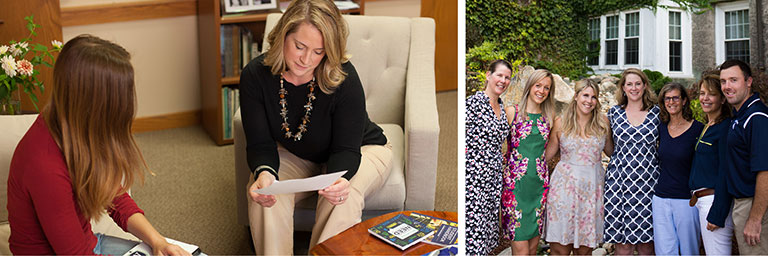Juniors, It’s Time to Start the College Process!
It’s never too early to start preparing for college applications. As most seniors will tell you, the clock ticks faster than you expect. junior year should be a time when students begin looking for colleges, and although it’s necessary, it’s sometimes a stressful step to take.
Ms. McDowell, a Wlliston college counselor, introduced all the basic information juniors need to get started and become prepared.
Dividing the whole college process into parts is crucial, McDowell said.
“Step one would be starting to figure out the kind of place you want to be,” she said. “Does a big research institution excite you? Does a school with religious affiliation excite you? Does a small school, big school, rural, urban [excite you?] There are so many qualities that you can look at it.”
In total, there are around 5,000 two-year and four-year colleges and universities in the United States. There is huge diversity, and it’s not an easy task to figure out which type of schools suits a specific student.
“Step two would be finding the schools with the qualities that present a range of admission selectivity,” said McDowell. “Having schools that are rich, viable, reachable, having schools that are within that target range where you should get in, and having some safe options that you are still happy with.”
“I think part of the step two is also to find if there is one or two dream schools that you really feel like is the perfect place for you,” McDowell added. “And to use that school as an early decision or early decision two, to use it to your advantage.”
“I think step three is just working towards the application, the writing, and all the supplemental pieces that are important in the process. Plan ahead for that. Don’t wait until you are just back from the summer and trying to do all that writing,” McDowell suggested. “Make sure you address some of it during your summertime. So you’ll have something ready to go when you come back.”
McDowell also answered several frequently asked questions.
Regarding standard test scores, McDowell said students usually started taking SAT or ACT sometime around junior year, in the spring. “It totally depends on you to decide how many times you want to take the SAT or ACT. There is no maximum,” McDowell told The Willistonian. “And definitely not a minimum.”
The calculation of GPA is also what lots of students care about. “We report GPA out of a hundred.” McDowell said. “And the colleges sometimes will convert it to a 4.0 GPA, but that’s how they handle all the schools.” There is a conversion chart online, and in order to get a 4.0 GPA students will need to get around a 94.5 out of 100 at Williston.
In the end, McDowell gave one last piece of advice: “Because of sort of the nature and frenzy around this process, it is common for many students to feel pressured. My advice is to really think outside the box. If you are thinking just New England, to open that box only a little bit actually brings so much more great opportunities for you.”
“There is school for everybody. That’s the best part,” McDowell concluded.
Several seniors currently in the midst of the process gave their suggestions.
“Start looking earlier than you think you need to,” said Grace Quisenberry ’17. “And look at different types of colleges even if you don’t think you’ll like them. Don’t let yourself get boxed in. ”
“I would highly encourage any applicant to peruse the Tufts Admissions blog. The articles and pieces of advice there are plenty published. They are so insightful, relaxing, and plain funny,” Tomasz Paluchowski ’17 said. “It’s much less about how many awards you’ve won, how many APs you take, or if you’ve done laboratory research than it is about effectively conveying certain ideas, qualities, or pieces of yourself to the admissions committee.”
Paluchowski continued: “At the end of the day, a human being is trying to get a glimpse of who you are and how you will fit into their campus. In fact, America’s college process is a very human process prone to bias and mistakes. It’s not an impersonal machine that admits people, but other people who admit people.”
“The purpose of a university education in America is just so much different than in other countries; there, it’s about a diploma and absorbed knowledge but here it is about so much more than sheer practicality,” said Paluchowski.
Shirley Zhou is a four-year senior at Williston. She is from Changshu, China. She enjoys listening to music, playing the guitar, and creative writing (preferably...










